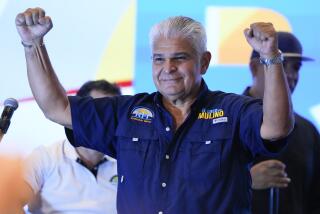New Panama President Replaces Ardito Barletta
PANAMA — Military pressure and political crisis gave Panama a new president Saturday when Eric Arturo Delvalle took the oath of office in a quickly improvised pre-dawn ceremony.
The change was a stark display of the political instability that plagues Panama, a country of major strategic importance to the United States. Since 1982, two other civilian presidents have been forced to resign by the armed forces.
Delvalle, 48, succeeded President Nicolas Ardito Barletta, who stepped down late Friday after an all-day meeting with military commanders.
One politician accused military authorities of deposing Ardito Barletta to distract attention from a scandal involving the army and a well-known Panamanian who was mysteriously decapitated.
Ardito Barletta, 47, had taken office last Oct. 11 after winning elections that were widely criticized as fraudulent. Delvalle, the leader of a small party with moderately conservative tendencies, was his first vice president.
After being sworn in by the national Legislative Assembly at a 3:30 a.m. ceremony, Delvalle declared that Panama is going through “one of the most difficult stages in its history.” He said that the change of government was not the result of “dark scheming,” but rather “the spontaneous combustion of a situation in continuous erosion.”
Delvalle’s administration inherits a $3.7-billion foreign debt that has this nation of 2.2 million people strapped. At the urging of international lending institutions, Ardito Barletta had imposed unpopular austerity measures.
As he faced a succession of strikes and protests, his support waned in the military-dominated Democratic Revolutionary Party, which heads the coalition that brought him to power.
Gen. Manuel Noriega, commander of the armed forces, openly criticized Ardito Barletta’s austerity measures and said that the national economy was “out of control.”
In a letter announcing his departure from the presidency--he did not call it a resignation--Ardito Barletta said that forces in the party and the armed forces “consider that they can no longer work with my presidency to . . . pull the country out of the difficult circumstances it is in.”
He added: “I wish to make a contribution to keeping the peace in our country by separating myself from the office to which I was elected.”
Until last year, Panama had not had an elected president since a 1968 coup. The armed forces openly ran the government even though civilians held the title of president.
At the urging of the United States, the military allowed elections last year. The military-backed candidate, Ardito Barletta, won by a scant 1,700-vote margin that foreign diplomats privately said was rigged by the armed forces.
In U.S. plans, the elections were part of a process aimed at implanting democratic stability in the troubled Central American area. Panama is especially important in those plans because of the strategic Panama Canal here.
Louis Martinz, a member of the opposition Panamenista Party, said the U.S. scenario is now jeopardized.
“The United States put all their eggs in this basket, and the basket is beginning to break,” Martinz said in an interview.
He said there is no doubt that Ardito Barletta was forced out by the armed forces. “They just took the rug out from under him,” Martinz said.
And he predicted that Delvalle would not last long as president.
Delvalle is a member of the Republican Party, which holds only two seats in the 67-member Legislative Assembly. He heads a wealthy family with interests in sugar milling, other industries and real estate.
He is said to be a moderate conservative, but he has little experience and no popular base. His only previous experience in public office was as a congressman for 11 days before the 1968 coup.
Ricardo Arias, head of the opposition Christian Democratic Party, said Saturday that the “immediate cause” of the change in presidents was a scandal over the death of Hugo Spadafora, a former deputy minister of health and a critic of the military.
Spadafora’s body was found decapitated Sept. 15 in Costa Rica, near the Panamanian border. His family says that it has been told by witnesses that he was last seen under arrest by Panamanian security agents on the Panamanian side of the border.
Arias said that increasing public demands for an investigation of alleged army responsibility in Spadafora’s death have put the military leadership in a bind. “The removal of Ardito Barletta was intended as a diversion,” Arias asserted. “They conceived this strategy of sacrificing an unpopular president to distract attention from them.”
Delvalle promised to support an investigation of the scandal.
More to Read
Sign up for Essential California
The most important California stories and recommendations in your inbox every morning.
You may occasionally receive promotional content from the Los Angeles Times.










